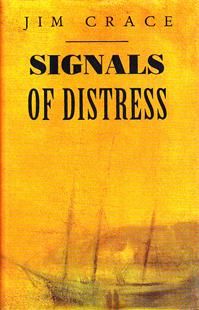
- Free Article: No
- Contents Category: Fiction
- Review Article: Yes
- Online Only: No
- Custom Highlight Text:
Reviewing Signals of Distress in the 11 Sept Guardian Weekly, Philip Hensher accuses Jim Crace of writing a ‘boy’s book’ in the meretricious style of a Golding feigning Conrad, and ending up all at sea.
- Book 1 Title: Signals of Distress
- Book 1 Biblio: Viking, $29.95 hb
- Book 1 Cover Small (400 x 600):

Hensher is right about one thing, however; Crace’s latest book is about ships, although the signals of distress of the title, are entirely human and all the action happens onshore where Crace breaches a bunch of American sailors, a lot of cows, newly-wed emigrants and a black slave. It’s a poor isolated community and the time is early last century. What follows is a period piece of remarkable authenticity and some of the most heart wrenchingly humane writing you could ever hope to find.
There is a central metaphor in the book, a rock the locals call the Cradle Rock a huge weighty mass which can be set in motion, for a while, to sway almost impossibly on its prehistoric perch. In a similar way, Crace’s book tethers the silly soaring heights of human desire to the rock of inevitability. The push and thrust might get things moving, but the best you can hope for is for things eventually to come to a stop. Push too hard and the whole thing could collapse.
What saves us from this Promethean prison? Not much, suggests Crace, except perhaps some moments of pure pleasure in the movement.
This is essentially a sad, even tragic, book, but there is so much humour, humanity and even a tentative glimmer of hope that you’d be a dry seed if you didn’t discern the light penetrating the earth. And what a cast of characters!
The young emigrant bride burns right to the tips of her red hair with the fire of newly discovered passion – with most of the males in the book elbowing their way in to warm their hands at the flame. The relentless way Crace has them all, from Priest to Puritan, justify their moth beatings reveals hypocrisy, greed and self-interest to be the order of the day.
And arriving simultaneously with the ship in distress there’s the do-gooding, inept and infuriatingly meddlesome Smith. He has come on a mission. His family soap firm no longer needs the community’s kelp and he wants to try to make good with the people by offering them a shilling and a few fortifying words. The task is impossible, but these are the kinds of missions Smith likes.
His troubles begin when he sets free the slave, enraging the captain who’d rather be off bedding the accommodating Alice Yapp than worrying about future loss of property. Smith’s Augustinian streak drives everyone, including himself, to distraction. He has so subverted his real desires with a perverted form of moral logic that they are almost inaccessible. They do, however, have a have a tendency to spurt out and one of these eruptions provides the book’s most poignant and amusing moment. Poor Smith. The rock between the hard place of his desire and his puritan zeal swings dangerously throughout the book, until its inevitable crash. (Inevitability plays a big role in Signals of Distress and has its crushing way with more than Smith by the time it is through.)
Otto the slave is a wonderful character, too, although he exists predominantly in the minds of others as a symbol of what they can’t control. Once loose, he is blamed for everything, from stealing food to fathering the whitest of babies. Crace could have been heavy-handed here, but underlining salient points is not his style. The slave is also the source of a moment of touching serendipity, so lightly handled it would be easy to miss. Watch for it and be tickled pink.
There are times in this book when the rhythm of the prose fits the cadences of the character’s thoughts with such accuracy you feel positively sewn into the seams of their clothes. At other times the thing rocks from one sentence to the next with such measure you have to go back and check you’re not aboard with the Ancient Mariner, or reading something with couplets by Peake or Poe.
So who’s all at sea, lagging behind Conrad then? Not this Lord Jim.


Comments powered by CComment